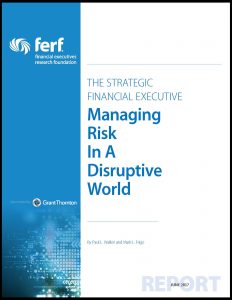Financial Executives and Risk
 What skills do financial executives need to manage risk successfully in a rapidly changing business environment? To answer this question, Ezerski Chair Mark L. Frigo of DePaul’s Driehaus College of Business and Paul L. Walker, Schiro/Zurich Chair in Enterprise Risk Management at St. John’s University, conducted interviews with financial executives from top companies.
What skills do financial executives need to manage risk successfully in a rapidly changing business environment? To answer this question, Ezerski Chair Mark L. Frigo of DePaul’s Driehaus College of Business and Paul L. Walker, Schiro/Zurich Chair in Enterprise Risk Management at St. John’s University, conducted interviews with financial executives from top companies.
“The scope of CFOs’ responsibilities toward enterprise risk management has been expanding,” Frigo says. “We wanted to identify the capabilities that CFOs need to have today, as well as tomorrow, to manage risk and anticipate disruptions before they impact organizations.”
CFOs and other executives from Microsoft, Oracle, Boeing, Dow Chemical, Martin Marietta, Coca-Cola and Pitney Bowes were among the leaders interviewed. Based on these interviews, the researchers identified four things financial executives must be able to do:
- Proactively recognize the sources of enterprise
- Develop insights and an enterprise-wide understanding of their organizations’ risk profiles and capabilities to manage risk.
- Think and communicate strategically.
- Create a forward-thinking, strategic finance organization.
Frigo and Walker’s research report, “The Strategic Financial Executive: Managing Enterprise Risk in a Disruptive World,” was sponsored by Grant Thornton and published by the Financial Executives Research Foundation.
Can Siri Become Your New BFF?
 Science fiction is full of stories about robots that become so lifelike that people can’t tell they’re not human. As our digital products increasingly take on the characteristics of people, researchers are looking to see whether science fiction may be morphing into science fact.
Science fiction is full of stories about robots that become so lifelike that people can’t tell they’re not human. As our digital products increasingly take on the characteristics of people, researchers are looking to see whether science fiction may be morphing into science fact.
“We are anthropomorphizing more and more of our products,” says James Mourey, assistant professor of marketing. “The best examples are Amazon’s Alexa or Siri on your iPhone. The theory we had is that if we make these increasingly humanized, to what extent do they start potentially replacing human-to-human interaction? And through a series of studies we show that, yes, scarily enough, products that do have humanized qualities can fulfill social needs, like the feeling that you belong, that are typically fulfilled by interpersonal interaction.”
But don’t worry—these “robots” are not really replacing your friends and loved ones. “Most people immediately jump to the doomsday scenario in which we are not going to be interacting with humans anymore. But what we find is that once you are told that your device is not human these effects go away.
“While there’s no replacing people with products,” Mourey says, “tech companies do need to be aware of the effect that these products can have on interpersonal relationships.” Mourey and two co-authors published their findings in the Journal of Consumer Research last January.|
By Robin Florzak
